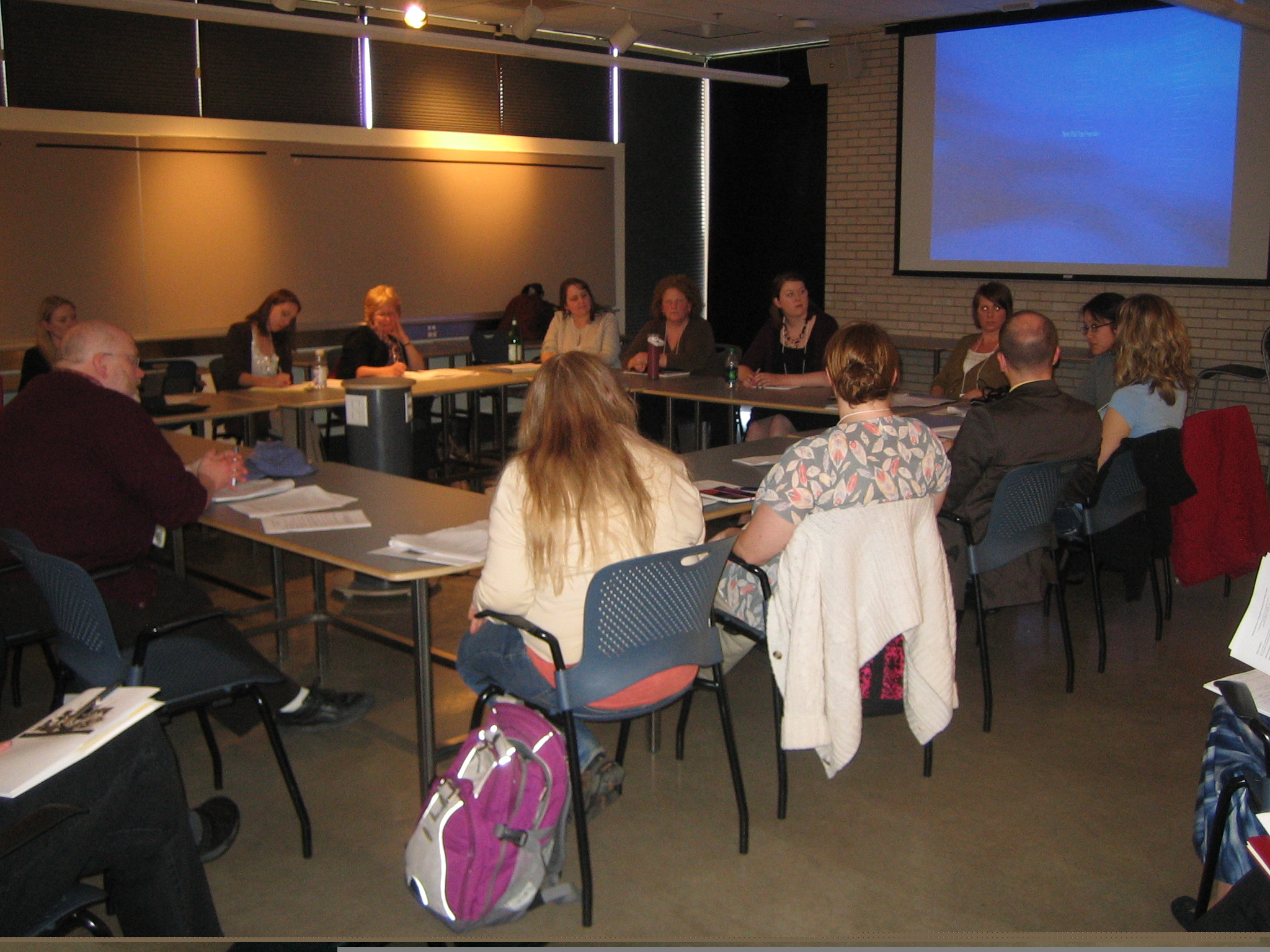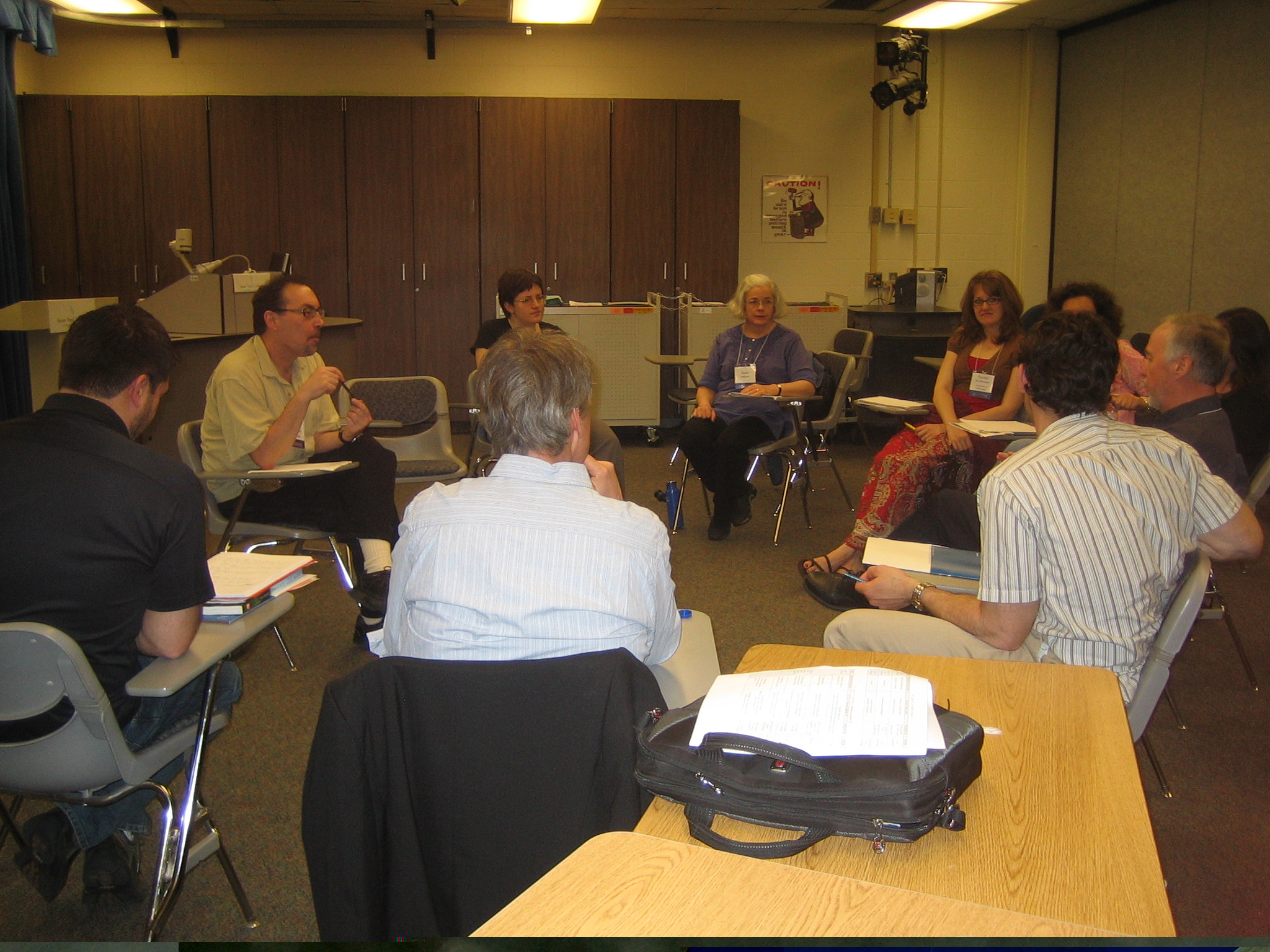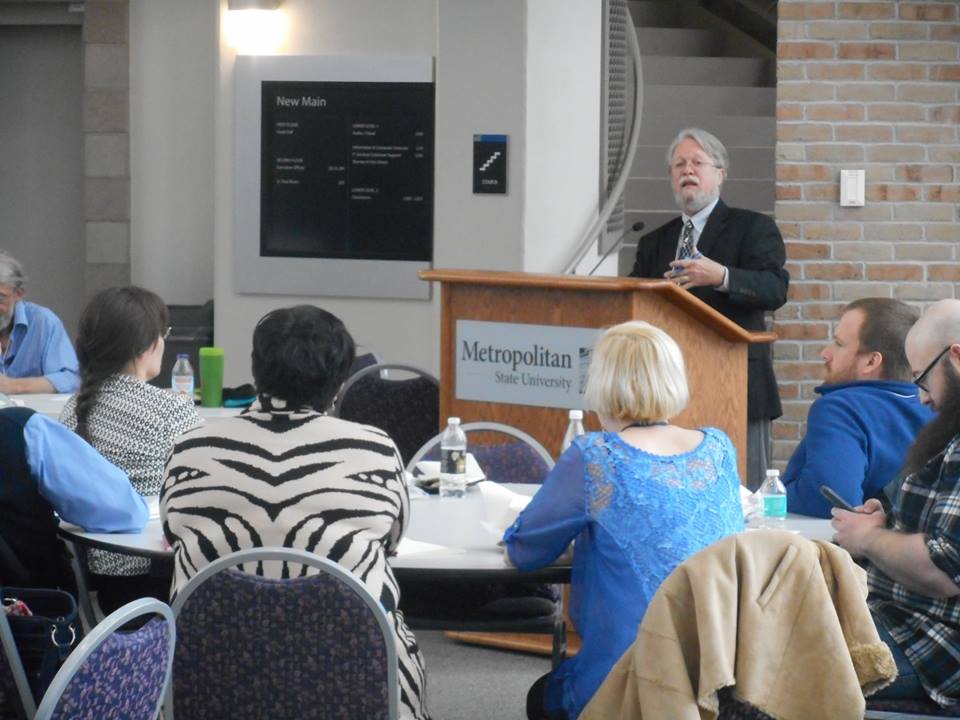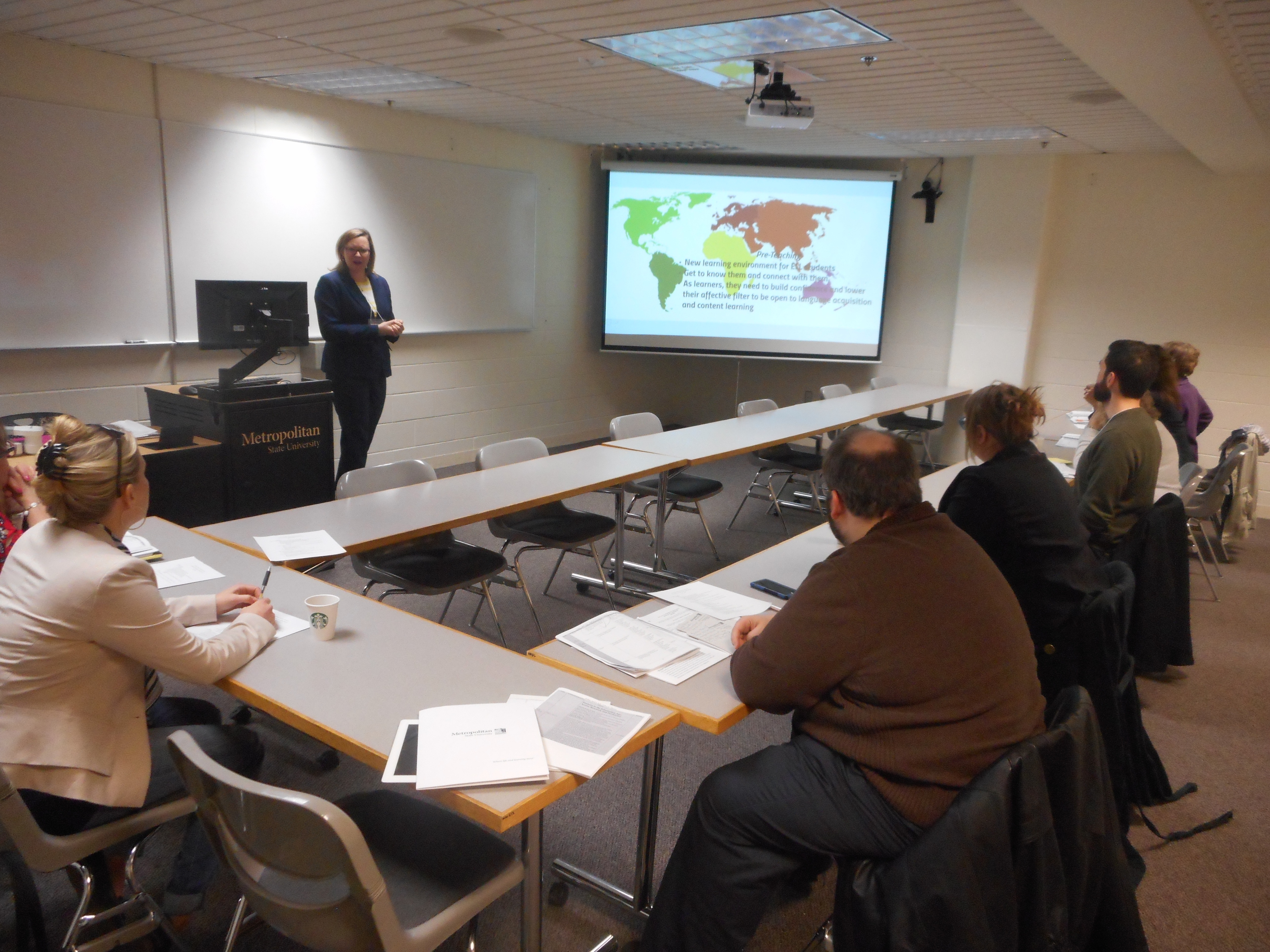|
“MnWE News” Late
Fall Issue,
Nov.-Dec. 2017
In this issue:
1. MnWE
CONF. MARCH
23-24, UM-TWIN
CITIES: “POINTS
OF
THE
COMPASS: ETHICS
OF OUR TIME.”
PROPOSALS DUE
January 19, 2018
2. MnSTATE
DISCIPLINE MTG.
IN ENG., EAP/ESOL,
& READING
February 23
3.
TIPS: TEACHING
“COLLEGE 101”
4. REVIEW:
IS DIGITAL
WRITING
DYSTOPIAN?
5. About
MnWE:
Forwarding
"News," Joining,
Grad Credit,
Reps.
If you are a
long-term member
of this
listserv, thank
you
for your
continued
participation.
If you are new,
welcome! Our
listserv
emails go to
about 2500
English,
Writing, and
related Upper
Midwest faculty.
To join, send a
request to the
editor at
richard at
jewell dot net.
Our website is
at
www.MnWE.org.
Our next
conference is at
UMN-TC
Fri.-Sat.,
3/23-24/18. You
are welcome to
attend our next
Committee
meeting at 3:30
pm Fri.,
1-26-18, at UM-TC
or by Skype at
“MnWEmeeting” at
https://join.skype.com/AqzB0BQoN7wu
. –Richard J.,
Editor
---
1. MnWE CONF.
MARCH 23-24,
UM-TWIN CITIES:
“POINTS OF
THE COMPASS:
ETHICS OF OUR
TIME.”
Deadline for
Proposals:
Jan. 19, 2018
We
are expecting a
strong turnout
for our MnWE
2018 Conference
at the
University of
Minnesota-East
Bank in
Minneapolis
Friday-Saturday,
March 23-24. Our
site host is the
university, and
we anticipate
that both
keynoters will
be UM
scholar-practitioners.
What would you
like to present
and/or hear? We
will be
discussing the
theme, “Points
of the Compass:
The Ethics of
Our Time” in
both pointed and
indirect ways.
How do
we–and
especially our
students–respond,
and how should
we respond, in
the classroom to
current ethics?
What students
are we building,
and what can and
should we build?
MnWE’s 2018
Conference
challenges us to
think of moral
dimensions of
our pedagogies
and to situate
academic
practices in
both the broader
cultural moment
and the futures
we are helping
prepare students
to engage and
create. We are
glad to accept
proposals on the
theme and on any
other concern
related to
writing,
literature, and
related
concerns. What
are you doing
that is new?
What concerns
and worries
would you like
to present? What
are you doing
that is old and
working
especially well?
Let us know by
sending us your
proposal. The
holiday break is
a great time to
create a
proposal! The
deadline for
proposals this
year is January
19, 2018.
---
Call for
Proposals, New
Website, and
Conference
Sign-up:
www.MnWE.org
---
2.
MnSTATE
DISCIPLINE MTG.
IN ENG., EAP/ESOL,
& READING
Feb. 23
A Discipline
Meeting for
English, ESOL/EAP,
and Reading has
been called for
Friday, February
23, 10 am-3 pm
at Normandale
Community
College’s Kopp
Center in its
Garden Room. The
event is free.
All are welcome
who work full or
part-time in
these fields in
any university
or college in
the Minnesota
State System, or
as part of
MnState-sponsored
college courses
in the high
schools in these
disciplines.
Each discipline
will have at
least some of
its own
sessions. To
RSVP and help
shape the
curriculum, go
to the URL
below.
---
https://goo.gl/forms/j6TAjZyIjR73M7mD3
---
3. TIPS:
TEACHING
“COLLEGE 101”
I teach
first-year
students quite
often, and over
thirty years,
I’ve developed a
casual but
helpful “College
101” curriculum:
once per week, I
talk for five or
ten minutes
about how to be
a college
student. Half or
more of our
students at many
colleges–even
the University
of Minnesota and
private
colleges–are
first-generation
college
students. As a
result, College
101 becomes
important to
them. They
rarely get such
advice
elsewhere–even
though they
should hear it
often.
What is
in College 101?
Topics include
how each credit
normally
requires three
hours of
commitment per
week; how
research shows
that if they get
to know three or
more students,
they will
strongly
increase their
likelihood of
success; how
each new way of
processing what
they
learn–writing,
talking, and
using
it–geometrically
increases their
recall; how
teachers and
counselors at
school can’t
share most
information with
others; study,
reading, and
skimming tips;
and much more.
Lately I’ve
started talking
about effects of
drugs and
alcohol on
learning; common
types of
depression and
getting help;
drinking and
sex; and borders
for appropriate
friendships and
romance.
Sometimes
in College 101,
I help students
blow off excess
emotion. For
example, after
the Presidential
election, I
asked them to
voluntarily
write for five
minutes on a
paper with no
name on it about
whom they voted
for, or would
have, and why.
I’ve also done
this with other
hot-button
topics.
Sometimes, when
the group might
learn from each
other, I ask
them–before they
start
writing–whether
they’d like me
to read the
results aloud
with no one
identified. I
carefully avoid
taking sides and
only offer
suggestions that
might channel
them toward
better
academics.
College
101 allows them
not only to
learn how to go
to college and
what is
appropriate both
academically and
culturally, but
also to feel
they have a safe
space in
college. As a
result, they are
more likely to
trust me and
other faculty,
to ask teachers
more questions,
and to be more
comfortable in
seeking help.
---
4. REVIEW:
IS DIGITAL
WRITING
DYSTOPIAN?
In “Our
digital
dystopia: A
diary,”
Rochester,
Minnesota writer
Paul John Scott
asks in the Nov.
12 Star
Tribune if
someday we will
“regret all this
change in the
media….” He says
that the digital
economy has
“upended the
business model
for print, and
in many places
laid waste to
its norms of
careful
attention to the
end product.”
Digital is, he
says,
“unregulated
mayhem of piracy
and pillaging
and
content-devouring-content,
a free-for-all
unleashed upon
our established
systems of
knowledge
organization and
social
expression.” He
talks about how
today, “everyone
can publish,
appear…or print
a CD, but few
can make a
living at it.”
It is, he says,
“not at all
clear this is a
sustainable way
to structure an
information
economy. Yet
we’ve only seen
the start of
it.”
Scott
worked for the
Village Voice
and the
respected
Men’s Journal
in the 1990s. He
describes the
1990s Voice
as a
“paper…being
created. It went
into boxes
positioned on
the street and
in the subways….
The arrival each
week…put
everyone in
proximity with
the same event.
There was no
swiping of your
thumb to move on
to something
better.” He adds
that Men’s
Journal
recently was
sold to a
conglomerate
that owns the
National
Enquirer,
which, he says,
is now “a field
trip to an
alternate
political
landscape…in
which Trump is
singularly
competent and
determined while
his opponents
are universally
malevolent and
cunning,” and
has been
“casting his
critics as
enemies of the
state.” He adds
that this same
conglomerate now
owns Us
Weekly and
is said to be
“eyeing the
purchase of
Rolling Stone,”
the venerable
rock news
magazine. We
are, says Scott,
“talking about a
transformational
change in pop
culture and
written word,
one clearly for
the worse, as if
that’s
possible.”
Scott’s
analysis mirrors
general concerns
among English
faculty that
public
understanding of
good writing is
being destroyed.
Indeed, writing
and literature
are trivialized
by Facebook news
and by emotive,
spontaneous
blogging,
texting, and
tweeting.
However,
aren’t more
people reading
more often, and
more of them
writing, than
ever before? And
might this be a
new beginning
for higher
quality reading
and writing? In
addition, the
professions
still need,
demand, and
reward better
writing. There
also is the
impressive
increase in
creative writing
in high schools
and colleges and
in online
forums. Even if
they provide a
greater quantity
of mediocre and
even bad
creative
writing, there
also appears to
be a renaissance
of high quality
literature among
younger authors.
Are we
developing a
“digital
dystopia,” as
Scott says? The
Internet does
present us with
more
thoughtless,
nonresearched,
emotional, and
even illiterate
writing, and
this can be
harmful.
However, our
society also
likely is
writing much
more. Perhaps
those acts of
writing give us
more opportunity
to teach people
to write and
read better.
---
Scott’s
Editorial:
www.startribune.com/our-digital-dystopia-a-diary/456732423/
---
5. About MnWE
(repeated in
each newsletter):
FORWARDING/JOINING:
Please forward
this email to
others,
especially if
you are a MnWE
representative
listed below, as
your new
full-time and
adjunct faculty
members,
graduate
students, and
writing center
tutors may not
receive it. If
you are not on
the listserv and
would like to
join it, simply
send your
request and
email address to
richard at
jewell dot net.
WHO WE ARE:
“MnWE” is
“Minnesota
Writing and
English,” an
organization
with a
coordinating
committee, a
listserv, and an
annual spring
conference by
and for college,
university, and
high school
English and
writing faculty,
graduate
students, and
related academic
and literary
scholars,
writers, tutors,
and others in
the Upper
Midwest. Our
purpose is to
bring together
these
communities in
Minnesota,
Wisconsin, north
and central
Iowa, and the
eastern
Dakotas. Our
website is
MnWE.org; our
geographical
center is
Minneapolis-St.
Paul. Over 2500
faculty, tutors,
and graduate
students are on
the listserv.
Our listserv
members come
from public and
private two-year
colleges, state
universities,
private
four-year and
graduate-degree
colleges, high
schools, and the
Universities of
Minnesota,
Wisconsin, and
North Dakota.
Our activities
are led by a
large, active
committee of
representative
members listed
below.
GRADUATE
CREDIT:
Anyone may earn
one graduate
credit from
Southwest
Minnesota State
University for
attending one
MnWE Conference
day and writing
a related
research paper
(for up to three
times). For
questions about
this course—“Eng
656: MnWE
Practicum”—please
contact lisa
dot lucas at
smsu dot edu
or see
www.smsu.edu/academics/programs/english/?id=11637 .
HOW TO REMOVE
YOURSELF FROM
THE LIST:
If you want to
be removed from
this listserv,
please do so
yourself,
following
directions at
the very bottom
of this email.
If you try
without success,
then send an
email to
richard at
jewell dot net
indicating (1)
this problem,
(2) your
specific email
address copied
from the
directions at
the bottom of a
MnWE mailing,
and (3) your
request for
removal.
FORMATTING,
INVITATION, &
CREDITS:
These listserv
emails usually
are formatted in
a simple way
using html. If
you cannot read
them, please go
to the link at
the top to see
them on the web.
If you
have any
questions, we
invite you to
email any of us
on the
committee. You
also are always
invited to
attend any of
our five MnWE
Committee
meetings per
year. You also
are invited to
offer
suggestions—or
volunteer your
leadership—for a
special or
double section
at the annual
conference.
This
newsletter is
written
primarily by
Richard Jewell
without
copyright so
that anyone may
quote,
paraphrase, or
forward any or
all of it
freely. We ask
only that you
give credit to
the “MnWE
Newsletter”
and/or “www.MnWE.org“;
and when you use
material that
has been quoted
or paraphrased
in this
newsletter from
other sources,
please be sure
to give credit
to the original
source.
REPRESENTATIVES:
Representatives
(as listed
below), please
forward each of
these emails:
many of your
writing and
English
colleagues may
not be on this
listserv.
Potential
volunteer
representatives:
We always
appreciate
hearing from you
if your school
has no rep. See
the
“Representatives”
list below, and
if no one at
your school is
on it, please
volunteer! Email
richard at
jewell dot net.
We are
especially
looking for reps
from Greater
Minnesota,
Canada, Iowa,
North and South
Dakota, and
Wisconsin.
---
---
Richard Jewell, Larry Sklaney, Danielle Hinrichs,
Anthony Miller, and Gordon and Beata Pueschner, Coordinators
Richard
at jewell
dot net
- (612) 870-7024
larry
dot
sklaney
at
century
dot edu
- (651) 747-4006
danielle
dot
hinrichs
at
metrostate
dot edu
- (651) 999-5960
a
dot
miller at nhcc
dot edu
gordon
dot
pueschner
at
century
dot edu
- (651) 686-4468
beata
dot
pueschner
at
anokaramsey
dot edu–(651)
686-4468
MnWE.org
Minnesota Writing & English
A Consortium of
Colleges &
Universities
|

Mission:
Transforming
writing and
English
into teaching
and learning
experiences
using
methodologies
that serve
students best.
Vision:
Bringing
scholarly ideas
and practical
pedagogy
together to
create our
futures.
.JPG)
Donald Ross of
the University
of
Minnesota and
Taiyon Coleman
of St. Catherine
University run a
breakout session
about
literature.

Geoffrey Sirc of
the University
of Minnesota
runs a small
breakout after
his keynote
presentation.

MnWE started in
2007.
The cofounders
were Richard
Jewell, here
giving a welcome
after lunch, and Donald
Ross, first
picture above.

During a 2016
breakout,
Beata Puschner
presents
on improving
classroom
inclusion of ELL
students.
|